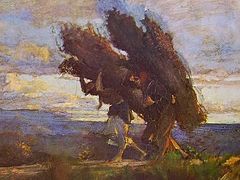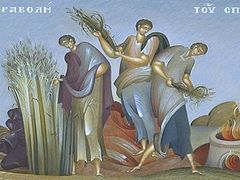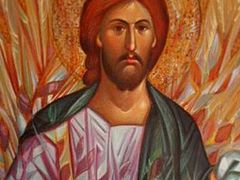In one of the parables about the Kingdom of God, the Savior says to the disciples:
The kingdom of God is as if a man should scatter seed on the ground, and should sleep by night and rise by day, and the seed should sprout and grow, he himself does not know how (Mark 4:26–27).
Interesting is the expression, he himself does not know how. If the words, a man should scatter seed on the ground can only point to Christ throwing the seed of the Gospel into the heart of man, then the phrase he himself does not know how cannot in any way refer to Him, since He is God, and therefore knows everything.
What then, is said here? Perhaps in this place, Scripture informs us of the following idea: After accepting the seed of the Gospel’s preaching into the human soul, this begins the process of the gradual ripening of the Kingdom of God; and this is a mystery, which cannot be rationally analyzed.
Indeed, the mystery of spiritual life is very similar to the germination of a seed in the ground, just as slowly and subtly, through the experience of dying and resurrection[1], the heart is translated to a new life and brings forth spiritual fruits.
As the earth conceals the growth of the seed within itself, until the first green shoots come out of the ground, likewise in man, the existence of a religious life is known only by its fruits.
The previous history of the development of the Gospel seed—the word of God—in the heart of a man, often remains incomprehensible to that very man himself. In speaking the words “I believe”, for the first time, we enter into an incomprehensible spiritual reality beyond our control, where [as the Irmos of the 9th Ode of the first Dormition Canon says.—Trans] “the bounds of nature are overcome.”[2] Logical schemes shatter, and all rational theories collapse.
At the same time, the believer, growing in experience, acquiring The Mind of Christ (1 Corinthians 2:16), with years of church life, begins to distinguish and detect the operations of certain spiritual laws, according to which the seed of faith grows and develops correctly in the earth of the heart.
The Holy Fathers wrote about these God-established laws in their aesthetic works. This is exactly what the Apostle Paul says in today’s [August 17, 2018.—Trans.] Epistle reading, revealing for us the edge of the veil over the “Holy of Holies”—the mysteries of the growth of the word of God in the human soul.
Moreover, brethren, I declare to you the gospel which I preached to you, which also you received and in which you stand, by which also you are saved, if you hold fast that word which I preached to you—unless you believed in vain. (1 Corinthians 15: 1 -2). Let us reflect on these words:
Moreover, brethren, I declare to you the gospel which I preached to you—faith often originates from preaching, which was heard. How then shall they call on Him in whom they have not believed? And how shall they believe in Him of whom they have not heard? And how shall they hear without a preacher? (Rom. 10:14)
The received word of God, sown into the depth of the heart, begins its secret work, like leaven in dough. However, that which was heard once before must be constantly repeated. Such is the nature of Man. He is prone to forget the most important things. It is amazing, for example, that it is part of our nature to always forget that we are going to die. If we remembered this always, then we would have lived differently. Also, awareness of the fact that God sees all our deeds, and even our innermost thoughts is constantly disappearing from our memory. If we remember this, the number of our sins would be drastically reduced!
Therefore, oddly enough, we need a constant reminder of even such great truths as the Resurrection of Christ, or the coming of the dread Last Judgement, or the undoubtable fact of our own death. Probably, mainly for this reason, we need sermons at every service.
Speaking of the same seed, Paul continues “which also you received” (1 Corinthians 15:1-2). Today, brothers and sisters the good news of the Gospel has more or less been heard by everyone. It is difficult to find people, (at least in our country), who never went to church, nor heard sermons. All have heard, but not all have received.
Why is this? The Parable of the Savior about the sower gives answer to this question: Behold, a sower went out to sow… (Matthew 13). According to this parable, the receiving of the seed depends on the state of the earth. Has it been cultivated, is it deep, are there no stones in it, do thorns grow in abundance therein?
According to the explanation of Christ Himself, the earth is (represents.—Trans.) a human heart. In modern man, this land is flooded and littered with garbage. It is difficult for the seed of the word of God to arise in such soil. The pride of ignorance, the unmoving self-love, the greed and arrogance of consumeristic consciousness, a cult of egotism, a view of the world as a resource for our passions, or as a stage for self-expression—these are the stones that interfere with the growth of the seed; these are the thorns that choke him. It is hard for modern man to bow his unsubmissive neck to the blessed yoke of the Lord’s commandments.
Those who came to the Church in adulthood surely remember how it was necessary to break themselves [their stubborn wills.—Trans.] at first. Backs do not want to prostrate, some inner shame does not allow one to cross themselves, it seems everyone in the church is looking at you with mockery.
It is too hard to get out of bed for Sunday service; in confession, the tongue dries to the larynx, you quickly get tired of services, you are both drawn to and avoiding going to church at the same time. And as with the Gospel, an inner protest rises inside of you.
That’s how millions of our compatriots for years past go to Church, and cannot cross the border between unbelief and belief/faith, death and life, destruction and salvation, emptiness and meaning.
The Lord granted us church-going people to accept the Gospel seed, but not all have yet accepted.
After the acceptance of the word of God, it is necessary to stand in it. In which you stand adds Saint Paul (1 Corinthians 15). Obviously, the gift of God requires a reciprocal effort on our part. The Gospel, in this sense, can be compared to a new computer program, which alone, without the participation of a human, cannot work. It needs to be installed, to begin to run, you must learn how to work with it, protect it from viruses. To stand in the Gospel means to run this program of salvation in your life, to begin the process of realizing Gospel meanings in everyday life.
Having stood in this way, we enter the firm path of salvation by which also you are saved, the Apostle continues. Accepted in the heart, having been well grounded on an honest and mature soul, the word of God enters into full force, and changes a person beyond recognition. But Paul reminds us of the manditory condition for salvation: if you hold fast that word which I preached to you—unless you believed in vain. Here’s an unexpected punch that must be taken! It turns out that it’s possible to “believe in vain”.
You can become like those who are “having a form of godliness but denying its power” (2 Tim. 3:5) of whom Paul writes about to Timothy. One can be someone who is disqualified. (2 Cor. 13:5) You could be like whitewashed tombs which indeed appear beautiful outwardly, but inside are full of dead men’s bones and all uncleanness (Matt. 23:27).
And to be as we should, Saint Paul says we must hold fast that word which I preached to you. What does this mean? To keep the unaltered unity in spirit and teaching, and not to let the fire of faith go out.
So here is the chain of events described by Paul:
In order to accept the word of God, it is necessary to stand in it – to comprehend it and to begin to live according to it. The beginning of life according to the Gospel means entering into the blessed ranks of the Saved—in The Church. Note, brothers and sisters, that not only baptism brings a person to the Church, but also living according to the Gospel. Fruitful living in the Church is possible only on the condition of unity with Her, unity in spirit and in doctrine. Only then will our faith not be in vain, only then will we be among those who know that we are not disqualified (2 Cor, 13:6).
Of course, there is nothing special or new here. We already know this. But distant knowledge does not always inform our actions, and often has little effect on our way of thinking. Therefore Saint Paul says: I declare to you [in Russian: I remind you.—Trans].
Let us try, dear Christians, to remind ourselves each day about this. Again and again we will discover the beauty of Orthodoxy, in the treasury of the word of God, and carry it into our lives. Orthodoxy is beautiful; let us make our souls thus beautiful. Orthodoxy is profound and deep; we cannot be shallow and vain. Orthodoxy is broad; let us broaden our hearts for love. Orthodoxy is Immortal; we also work for eternal life, in which the Fountain of beauty, love, and immortality awaits us—Christ our True God.
He is the one whom the Apostle is constantly reminding us about, and to Him we also direct our every thought, so that His Holy Name will be glorified, through the consubstantial Spirit, to the glory of God the Father!





